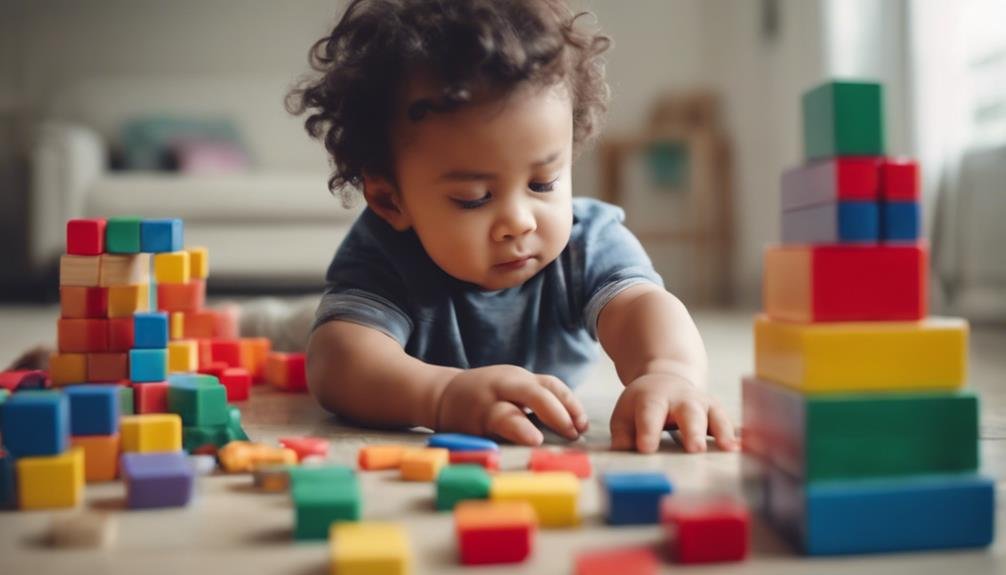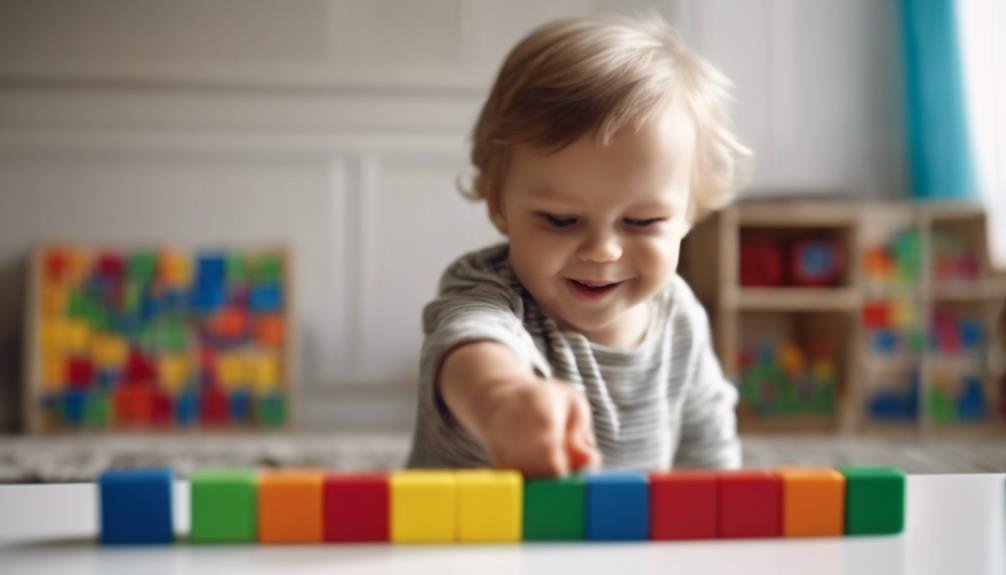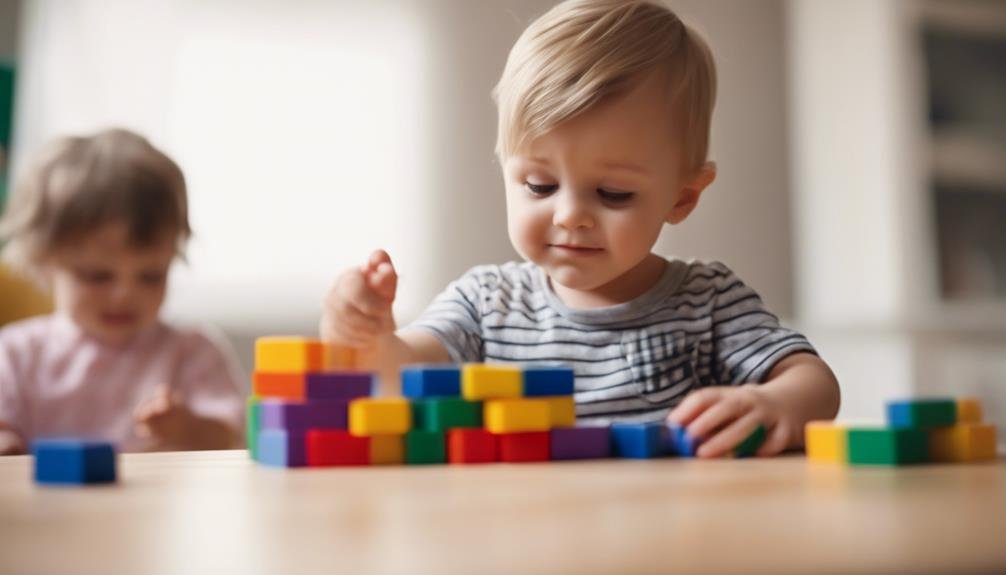Cultivating Early Math Skills in Toddlers: Fun and Engaging Methods
Have you ever wondered how early exposure to math can shape toddlers' learning abilities in the long run? Imagine a world where basic math skills are seamlessly integrated into everyday activities, making learning enjoyable and natural for young minds. The methods used to introduce math concepts to toddlers hold the key to unlocking their potential and nurturing a strong foundation for future academic success. Let's explore some innovative and engaging ways to cultivate early math skills in toddlers, setting them on a path towards numerical confidence and problem-solving proficiency.
Key Takeaways
- Incorporate math into daily routines to make learning fun and natural.
- Engage toddlers with counting games like treasure hunts and hopscotch.
- Explore shapes and patterns through play to enhance spatial skills.
- Introduce basic number concepts creatively using songs and visual aids.
- Utilize storytelling to weave math into engaging narratives for skill development.
Importance of Early Math Exposure

When it comes to nurturing young minds, providing early math exposure sets the stage for a lifetime of numerical confidence and success. Introducing basic math concepts to toddlers in a playful manner not only ignites their curiosity but also builds a strong foundation for future learning. From recognizing shapes in everyday objects to counting toys during playtime, these simple activities help children develop essential cognitive skills that are crucial for their academic journey.
Through early math exposure, children begin to understand the fundamental principles that govern the world around them. Concepts like counting, sorting, and patterns become familiar, empowering toddlers to make sense of their environment with a newfound sense of control and understanding. As they engage in these math-related activities, their problem-solving abilities are honed, preparing them for more complex challenges as they grow.
Incorporating Math in Daily Routine
As you navigate your toddler's daily routines, infusing math into everyday activities can effortlessly spark their curiosity and enhance their cognitive development. Simple tasks like counting the number of steps as you go up or down, arranging toys by size or color, or even talking about shapes during snack time can lay a strong foundation for early math skills.
While preparing meals, involve your little one by asking how many fruits they see or counting the number of plates needed for the family. During bath time, talk about the shapes of their toys or count the bubbles they pop. Even bedtime routines can be transformed into a math learning opportunity by incorporating counting while brushing teeth or talking about the days of the week.
Fun With Counting Games

Get ready to explore the exciting world of numbers with your little one through engaging counting games that will make learning math a fun and interactive experience!
Counting games are a fantastic way to introduce your toddler to the magic of numbers while keeping them entertained. Here are some delightful ideas to get you started:
- Number Treasure Hunt: Hide objects around the house and ask your child to find a specific number of items.
- Counting with Toys: Use their favorite toys to practice counting and grouping them into sets.
- Hopscotch Math: Draw a hopscotch grid and assign numbers to each square for a physical counting adventure.
- Song and Dance Counting: Create a fun counting song or dance routine to engage both their auditory and kinesthetic senses.
- Nature Walk Tally: Take a stroll outside and tally up the number of birds, flowers, or other items you spot.
With these engaging counting games, your little one will be on their way to becoming a math whiz in no time!
Exploring Shapes and Patterns
Embark on a colorful journey of discovery as you delve into the world of shapes and patterns with your little one! Exploring shapes and patterns can be a delightful adventure full of learning and fun. Introduce your toddler to the fascinating realm of geometry through playful activities that stimulate their cognitive development.
To make learning engaging, try incorporating different shapes and patterns into everyday play. Use toys or household items to demonstrate shapes like circles, squares, triangles, and rectangles. Create simple patterns using objects like blocks or stickers to help your child understand the concept of repetition and sequence.
Let's dive into a fun activity to explore shapes and patterns:
| Shape | Description | Pattern | Description |
|---|---|---|---|
| Circle | Round like a ball | ABAB | Red, Blue, Red, Blue |
| Square | Has four equal sides | AABB | Yellow, Yellow, Green, Green |
| Triangle | Three sides and angles | ABC | Blue, Red, Green |
Engage in these activities regularly to enhance your toddler's spatial awareness and pattern recognition skills. Watch as their eyes light up with each new discovery!
Introducing Basic Number Concepts

Let's dive into the exciting world of numbers and start exploring basic number concepts with your little learner! Understanding numbers is a crucial early math skill that can be introduced in simple and playful ways. Here are some fun ideas to get you started:
- Counting Everything: Encourage counting everyday objects like toys, snacks, or steps to help your toddler grasp the concept of numbers.
- Number Songs and Rhymes: Singing songs or reciting rhymes that involve counting can make learning numbers enjoyable and memorable.
- Number Flashcards: Using colorful number flashcards can help your child visually connect the numeral with the quantity it represents.
- Number Blocks: Introducing number blocks allows your toddler to see and feel the numbers, making it a hands-on learning experience.
- Number Games: Engage in simple number games like 'What Comes Next?' or 'Number Hunt' to make learning numbers interactive and exciting for your little one.
Engaging Math Through Play
Wondering how to make math fun and interactive for your toddler? Engaging math through play is a fantastic way to spark your little one's curiosity and love for numbers. You can turn everyday activities into math adventures without them even realizing it! Try counting the number of toys they've or sorting them by color and shape. Use building blocks to create simple patterns or shapes together. Incorporate math into their favorite games by counting steps or rolls of the dice.
Another playful idea is to set up a pretend shop where your toddler can 'buy' items using play money, helping them understand basic addition and subtraction. Puzzles are also a great way to enhance math skills – sorting pieces, recognizing shapes, and figuring out how they fit together. Outdoor activities like counting flowers in the garden or measuring how far they can jump can make math feel like a fun adventure.
Utilizing Math in Storytelling

Explore the enchanting world of storytelling where math becomes a magical tool to weave numbers into tales that captivate young minds. When you infuse math into storytelling, you create an engaging learning experience that sparks curiosity and enhances early math skills effortlessly.
Here are some playful ways to utilize math in storytelling:
- Counting Adventures: Embark on a journey where characters count their way through forests, oceans, and castles, reinforcing counting skills.
- Shape Quests: Discover hidden shape treasures within the story, encouraging recognition of shapes in a fun narrative.
- Pattern Puzzles: Solve pattern mysteries woven into the plot, stimulating pattern recognition and logic skills.
- Measurement Missions: Help characters measure objects or distances in the story, introducing basic concepts of measurement in a creative way.
- Problem-Solving Sagas: Join characters in overcoming math-related challenges, promoting critical thinking and problem-solving skills through the narrative.
Incorporating math into storytelling not only makes learning enjoyable but also builds a strong foundation for mathematical concepts in your little one's mind.
Enhancing Problem-Solving Skills
Enhance your problem-solving prowess through engaging activities that ignite your analytical thinking skills. Solving puzzles, riddles, and math games can boost your cognitive abilities while having fun. Here's a playful way to enhance your problem-solving skills:
| Activity | Description |
|---|---|
| Shape Sorting | Sort various shapes into the correct categories. |
| Counting Challenge | Count objects and match them with the right number. |
| Pattern Recognition | Identify and continue patterns for brain exercise. |
| Maze Navigation | Find your way through mazes using logic and reasoning. |
Engaging in these activities can help you develop critical thinking and analytical skills from a young age. By practicing problem-solving in a playful manner, you are setting a strong foundation for future math proficiency. So, grab a puzzle or embark on a counting adventure to unleash your inner problem-solver!
Celebrating Math Milestones

As you progress through your problem-solving activities, you'll soon reach exciting milestones in your math journey that are worth celebrating. Each achievement brings you closer to becoming a math whiz!
Here are some fantastic ways to celebrate those math milestones:
- High-Five Yourself: Give yourself a high-five for each new concept mastered. You're doing amazing!
- Create a Math Chart: Track your progress with a colorful chart. Watching it fill up will boost your confidence.
- Reward Yourself: Treat yourself to a special snack or fun activity every time you conquer a challenging math task.
- Share Your Success: Tell your family and friends about your math milestones. They'll cheer you on!
- Set New Goals: Celebrate by setting exciting new goals for your math journey. Keep the momentum going!
Frequently Asked Questions
How Can I Encourage Math Skills During Outdoor Activities?
Want to boost math skills during outdoor fun? Count the flowers, measure the distance you run, or sort rocks by size. Make math a game! You'll be having a blast while learning!
Are There Any Recommended Math-Related Apps for Toddlers?
You'll love math-related apps for toddlers! Explore apps like "Endless Numbers" and "Todo Math" to make learning fun. Engaging activities, colorful visuals, and interactive games will captivate your little one's curiosity. Enjoy the journey!
What Role Does Music Play in Developing Early Math Skills?
Music enhances early math skills by teaching rhythm, patterns, and counting. Through songs, toddlers grasp concepts like sequencing and tempo, laying a foundation for mathematical understanding. Sing, dance, and explore numbers together for a harmonious learning experience.
Can Pets Be Incorporated Into Math Learning for Toddlers?
Absolutely! Pets can make math learning fun for toddlers. Counting treats for a dog or sorting toys with a cat can teach numbers and patterns. They offer a playful way to explore math concepts!
How Can I Address Math Anxiety in Young Children?
Hey there! To address math anxiety in young children, you can keep things light and fun. Encourage exploration, use games, and show them that making mistakes is part of learning. Keep it positive and show them math is cool!
Conclusion
Congratulations on taking the first step in cultivating your toddler's math skills! Remember, 'practice makes perfect.'
By incorporating fun and engaging math activities into your daily routine, you're setting the stage for your little one's future mathematical success.
Keep exploring shapes, counting games, and number concepts through play to spark curiosity and build a strong foundation for their numerical confidence.
Embrace the journey of learning and watch your child flourish in the world of numbers!



